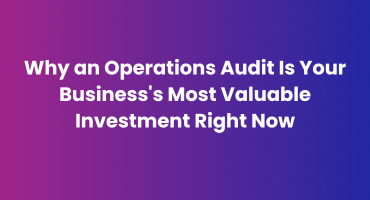
In today’s competitive business landscape, efficiency isn’t just a luxury; it’s a necessity for survival. Many businesses lose time, money, and valuable opportunities without realising that the root cause lies in operational inefficiencies. An operations audit could be the game-changer that not only highlights these inefficiencies but also paves the way for sustainable growth.
What is an Operations Audit?
Think of an operations audit as a health check-up for your business. It’s a thorough review of your internal processes, workflows, and systems in areas like project management, sales, and automation. The goal isn’t just to find what’s broken but to identify opportunities for optimisation, so your business runs at peak efficiency.
The Hidden Costs of Inefficiency
Before diving into the benefits of an audit, it’s essential to understand what inefficient operations may already be costing you:
-
Lost Productivity:
Studies show that employees spend up to 60% of their time on coordination rather than meaningful work.
-
Revenue Leakage:
Inefficient processes can result in unbilled hours and scope creep.
-
Missed Opportunities:
Slow processes often lead to missed clients and business growth opportunities.
-
Employee Burnout:
Poor systems increase stress and lead to job dissatisfaction.
-
Customer Dissatisfaction:
Operational issues eventually affect customer experience and loyalty.
Why Is an Operations Audit Important?
An operations audit offers transformative benefits that help your business thrive. Here’s how:
Identify Bottlenecks and Inefficiencies
Every business has processes that slow things down—whether it’s outdated manual tasks or redundant steps. An audit brings these bottlenecks to light, allowing you to streamline workflows and free up valuable time and resources.
Immediate Cost Savings
By uncovering inefficiencies and wasted resources, companies typically find significant cost reduction opportunities. For many businesses, an audit reveals areas where up to 20-30% of costs can be cut almost immediately.
Optimise Your Technology Stack
Many companies underutilize the tools they already have or rely on outdated software. An operations audit helps you maximise your current technology, whether by automating repetitive tasks or integrating systems for smoother data flow.
Improve Project Management
Struggling to keep projects on time and within budget? An audit examines your current project management systems and suggests ways to enhance communication, streamline task assignments, and ensure timely delivery.
Enhance Sales Processes
Sales drive growth, but inefficient processes can leave money on the table. An operations audit identifies gaps in your sales funnel, improves lead management, and ensures that no opportunity slips through the cracks.
Boost Team Morale
When your systems work smoothly, your team feels less stressed and more productive. An audit removes operational frustrations, allowing employees to focus on meaningful work rather than administrative headaches.
Support Scalable Growth
As your business expands, your operations need to evolve. An audit assesses whether your current processes can scale with your growth, ensuring your infrastructure is ready to handle new demands efficiently.
Ensure Compliance and Risk Mitigation
Staying compliant with industry regulations is critical. An operations audit helps ensure that your business is following all necessary guidelines and proactively manages potential risks.
When Should You Conduct an Operations Audit?
There’s never a wrong time for an operations audit, but certain situations call for one urgently:
- Rapid Growth: As your business scales, an audit ensures your operations can handle the expansion.
- Declining Performance: If projects are delayed or costs are rising, an audit helps you identify the root causes.
- Technology Upgrades: Before implementing new software, an audit ensures a smooth integration.
- Regulatory Changes: An audit keeps your business compliant with evolving laws and regulations.
A Real-World Example: A Mid-Sized Marketing Agency’s Transformation
A mid-sized marketing agency struggled with project overruns, untracked billable hours, and team burnout. After an operations audit, they identified:
- 30% of billable time was going untracked.
- Project managers were spending 15 hours a week on manual updates.
- Key client communications were falling through the cracks.
The results? Billable hours increased by 25%, project management time was reduced by 60%, and client satisfaction improved by 40%.
How to Get the Most Out of Your Operations Audit
Prepare Thoroughly
Document your current processes, gather data, and outline known challenges.
Stay Open-Minded
Be willing to question “the way things have always been done.”
Involve Your Team
Your front-line staff often have the best insights into inefficiencies.
Prioritise Action
Use the audit results to implement quick wins while planning for long-term improvements.
The Cost of Waiting
Every day you operate with inefficient systems costs you in terms of productivity, revenue, and team morale. Can your business afford to wait any longer?
Your Roadmap to Operational Excellence
In a world where efficiency can make or break a business, an operations audit is more than just a review—it’s the key to unlocking your company’s full potential. From cutting costs to boosting productivity and scalability, the benefits are too significant to ignore.
Ready to transform your business operations? Book your free 1-hour operations audit today, and take the first step towards operational excellence. This will be a one to one personalised session. This is a limited time offer.
